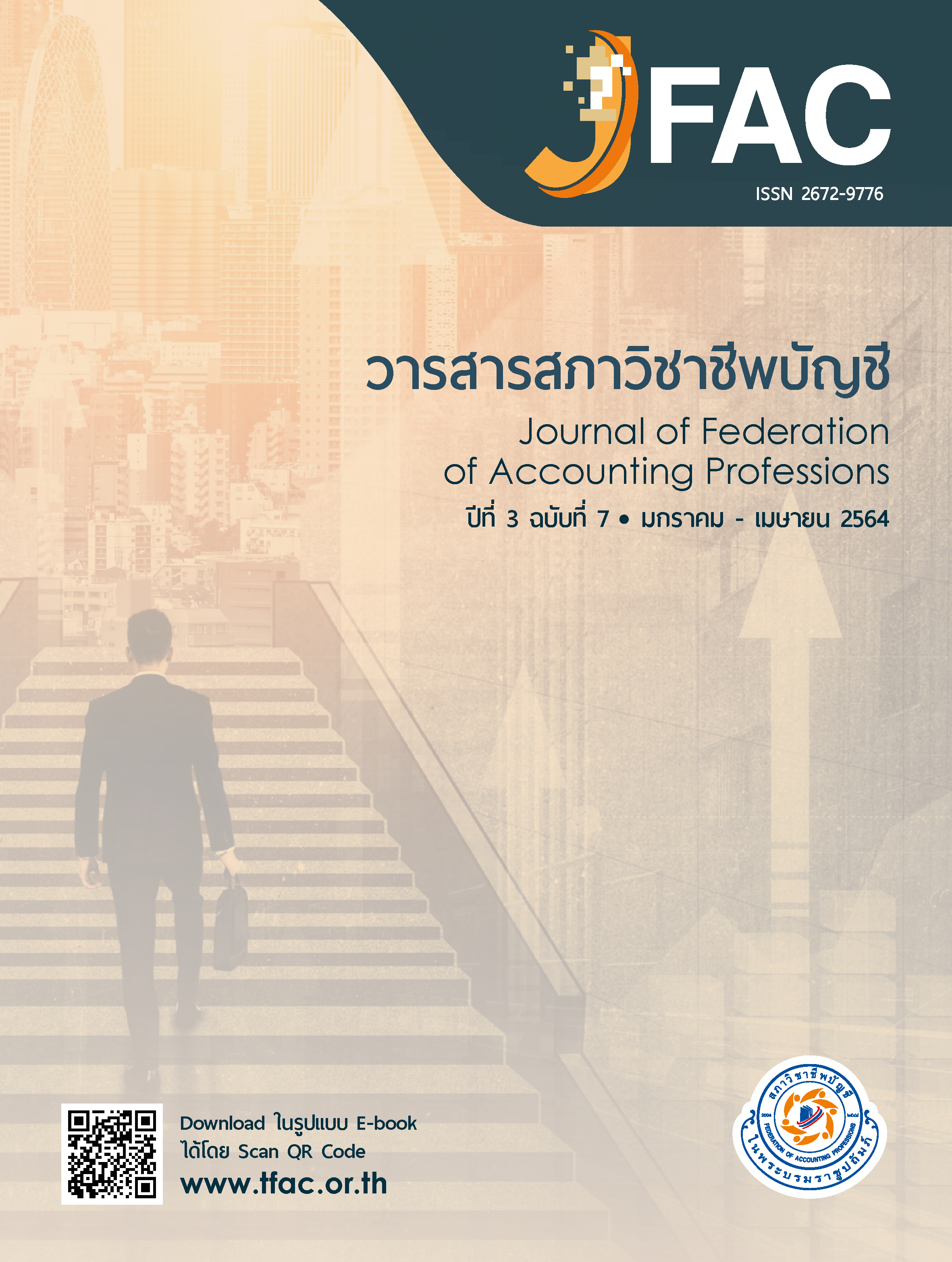การศึกษาความสัมพันธ์ระหว่างเพศของประธานเจ้าหน้าที่บริหารด้านการเงิน ระดับการศึกษา กับผลการดำเนินงานของบริษัท: กรณีศึกษาบริษัทจดทะเบียนในตลาดหลักทรัพย์แห่งประเทศไทยในกลุ่มอุตสาหกรรมเทคโนโลยี
Main Article Content
บทคัดย่อ
การศึกษาฉบับนี้มีวัตถุประสงค์เพื่อศึกษาความสัมพันธ์ระหว่างเพศของประธานเจ้าหน้าที่บริหารด้านการเงิน (CFO) ระดับการศึกษา กับผลการดำเนินงานของบริษัทจดทะเบียนในตลาดหลักทรัพย์แห่งประเทศไทยในกลุ่มอุตสาหกรรมเทคโนโลยี ซึ่งผลการดำเนินงานของบริษัทชี้วัดโดยอัตราผลตอบแทนต่อสินทรัพย์ (ROA) การศึกษานี้วิเคราะห์ข้อมูลโดยใช้สถิติเชิงพรรณนาและสถิติเชิงอนุมานในการวิเคราะห์กลุ่มตัวอย่างรวมทั้งสิ้นจำนวน 36 บริษัท ตั้งแต่ปี พ.ศ. 2558 ถึง 2562 เป็นจำนวน 5 ปี
ผลการศึกษาพบว่าระดับการศึกษาของประธานเจ้าหน้าที่บริหารด้านการเงินมีความสัมพันธ์อย่างมีนัยสำคัญเชิงบวกกับผลการดำเนินงานของบริษัทจดทะเบียนในตลาดหลักทรัพย์แห่งประเทศไทยในกลุ่มอุตสาหกรรมเทคโนโลยี แสดงว่าประธานเจ้าหน้าที่บริหารด้านการเงินที่จบการศึกษาสูงกว่าระดับปริญญาตรีส่งผลเชิงบวกต่อผลการดำเนินงานของบริษัท อย่างไรก็ตาม ผลการศึกษาไม่พบความสัมพันธ์อย่างมีนัยสำคัญระหว่างเพศของประธานเจ้าหน้าที่บริหารด้านการเงินกับผลการดำเนินงานของบริษัท
Article Details
เนื้อหาและข้อมูลในบทความที่ลงตีพิมพ์ในวารสารสภาวิชาชีพบัญชี ถือเป็นข้อคิดเห็นและความรับผิดชอบของผู้เขียนบทความโดยตรงซึ่งกองบรรณาธิการวารสารไม่จำเป็นต้องเห็นด้วยหรือร่วมรับผิดชอบใด ๆ
บทความ ข้อมูล เนื้อหา รูปภาพ ฯลฯ ที่ได้รับการตีพิมพ์ในวารสารสภาวิชาชีพบัญชี ถือเป็นลิขสิทธิ์ของวารสารสภาวิชาชีพบัญชี หากบุคคลหรือหน่วยงานใดต้องการนำข้อมูลทั้งหมดหรือบางส่วนไปเผยแพร่ต่อหรือเพื่อกระทำการใดๆ จะต้องได้รับอนุญาตเป็นลายลักษณ์อักษรจากวารสารสภาวิชาชีพบัญชี ก่อนเท่านั้น
เอกสารอ้างอิง
เอกสารอ้างอิง
ภาษาไทย
พันธ์ศักดิ์ อาภาขจร. (2561). ผู้หญิงไม่เก่งเทคโนโลยี ความจริงคนละมุม. [เว็บบล็อก]. สืบค้นจาก https://www.isranews.org/isranews/69742-woman69742.html
ภาษาอังกฤษ
Akbas, H. E., & Karaduman, H. A. (2012). The effect of firm size on profitability: An
empirical investigation on Turkish manufacturing companies. European Journal of Economics, Finance and Administrative Sciences, 55, 21-27.
Bhagat, S., Bolton, B., & Subramanian, A. (2010). CEO education, CEO turnover, and
firm performance. University of Colorado-Boulder working paper, 3-5.
Carpenter, M. A., Geletkanycz, M. A., & Sanders, W. G. (2004). Upper echelons
research revisited: Antecedents, elements, and consequences of top management team composition. Journal of Management, 30(6), 749–778.
Chadwick, I. C., & Dawson, A., (2018). Women leaders and firm performance in family
businesses: An eamination of financial and nonfinancial outcome. Journal of
Family Business Strategy, 9, 238 - 249.
Eagly, A. H., & Johnson, B. T. (1990). Gender and Leadership Style: A Meta-Analysis.
Psychological bulletin, 108(2), 250-256.
Fama, E. F. (1980). Agency problems and the theory of the firm. Journal of Political
Economy, 88(2), 288-307.
Fama, E. F., & M. C. Jensen. (1983). Separation of ownership and control. Journal of
Law and Economics, 26(2), 25.
Gaur, J,, & Gupta, R. (2011). Comparing firm performance on the basis of age, size,
leverage, and group affiliation in Indian IT industry. Romanian Journal of
Marketing, 6(3).
Goktepe, J. R., & Schneier, C. E. (1989). Role of sex, gender roles, and attraction in
predicting emergent leaders. Journal of Applied Psychology, 74(1), 165–167.
Gottesman, A., & Morey, M. R. (2015). CEO Educational Background and Firm
Financial Performance. Journal of Applied Finance (Formerly Financial Practice and Education), 20(2), 10-12.
Hambrick, D. C., & Mason, P. A. (1984). Upper echelons: The organization as a
reflection of its top managers. The Academy of Management Review, 9(2), 193–206.
Jensen, M. C., & Meckling W. H. (1997). Theory of the firm: Managerial behavior,
agency costs and ownership structure. Journal of Financial Economics, 3(4), 305-360.
Jing L., & Smith D., & Liu X. (2019). Female CFOs and accounting fraud: Evidence
from China. Pacific-Basin Finance Journal, 53, 449-463.
Johnson, P. (1976). Women and Power: Toward a Theory of Effectiveness, Journal of Social
Issues, 32(3), 99-110.
Khan, W. A, & Vieito, J. P. (2013). CEO gender and firm performance. Journal of
Economics and Business, 67, 55-66.
King, T., Srivastav, A., & Williams, J. (2016). What's in an education? Implications of
CEO education for bank performance. Journal of Corporate Finance, 2016, 37(C), 287-308.
Krishnan, G. V., & Parsons, L. M. (2008). Getting to the bottom line: An exploration of
gender and earnings quality. Journal of Business Ethics, 78, 65-76.
Majumdar, KS. (1997). The impact of size and age on firm-level performance: Some
evidence from India. Review of Industrial Organization, 12, 231-241.
Ofe Hosea Ayaba. (2012). Chief Executive Officer’s (CEO’s) educational background
and firm performance: An empirical study on Manufacturing and IT listed firms in the Stockholm Stock Exchange. Umeå School of Business and Economics (USBE), 62, 45-50.
Peni, E., & Vahamaa, S. (2010). Female executives and earnings management. Managerial
Finance, 36, 629-645.


